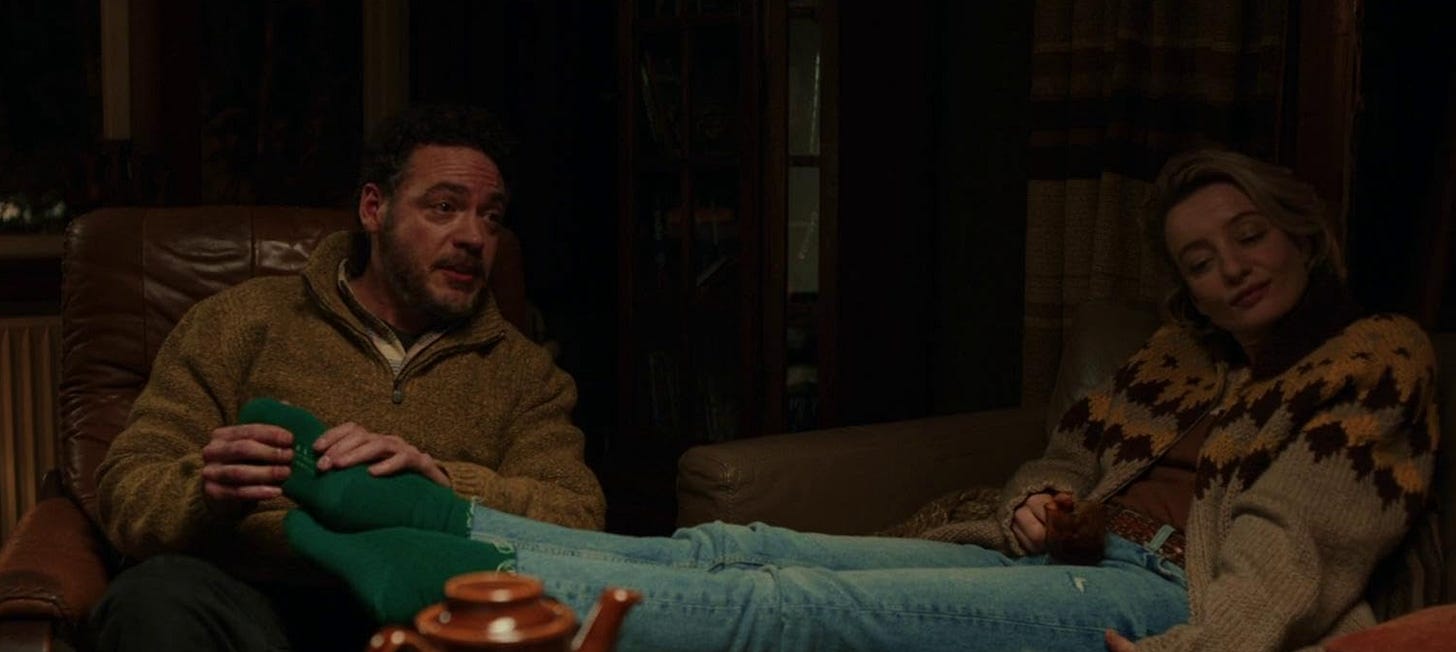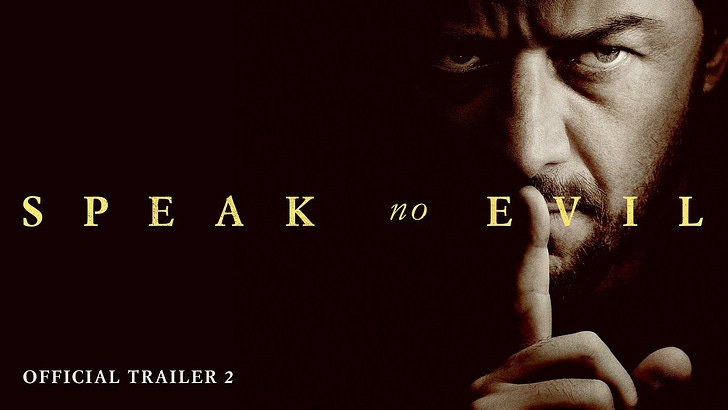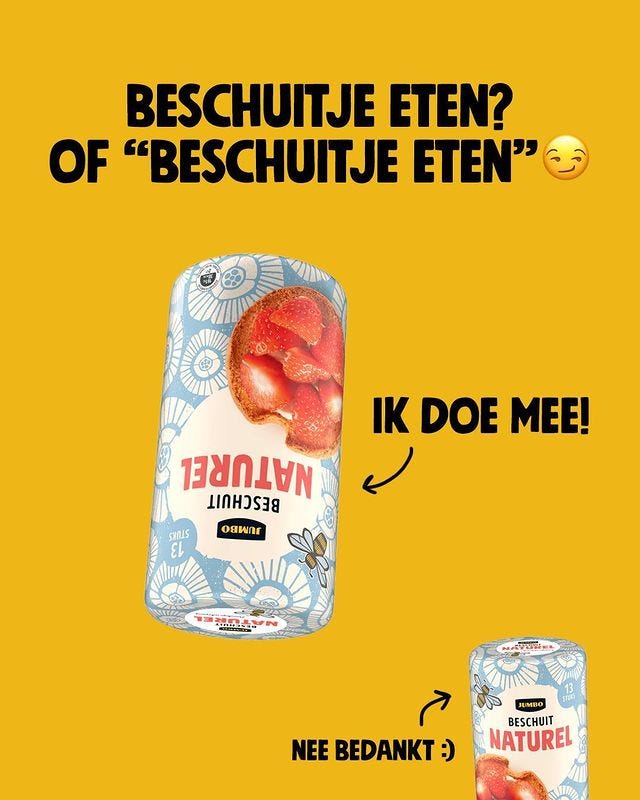The Speak No Evil films explain everything about Dutch and American culture
Only a horror franchise could do it
If you want to understand culture and politics in the west today, you only need to watch the two Speak No Evil horror films—the excellent 2022 Dutch-Danish original, and the 2024 American-British adaptation, now in theaters.
European politics are usually seen as fragmented, with a million parties across fifty countries. The implicit, provocative argument in Speak No Evil (2022) is that these politics are actually polarized.
In the movie, a Danish family meets a Dutch family on holiday in Italy. The Danes accept an invitation to visit these new friends in the Netherlands, where an idyllic weekend descends into horror.
The ending of the 2022 film is incredibly dark; the director Christian Tafdrup set out to make “the most disturbing film ever in Danish cinema.” So I wondered, why make the villains in the original version Dutch? It would’ve conceivably fit the narrative to make them from anywhere in Europe.
In the 2022 film, on one side we have a Danish couple who are polite, urbane, and don’t come across as particularly Danish. Rather, they are avatars for a certain type of western, eco-conscious, upper middle class couple, what the Dutch call havermilk elite (oatmilk elite). Louise and Bjorn live in a high rise apartment building that could be anywhere and eat placeless modern food. Louise is a vegetarian, stresses about her daughter having too much sugar, and has climate-related vliegschaamte (flying shame).
On the other side, the Dutch are nationalists, almost wholly defined by their patriotism. Like when Dutch husband Patrick laments the fact that the Netherlands is not recognized as “a producer of fine and high quality cheese like Italy or France... I sometimes feel that Dutch cheese is not getting the respect it deserves.” (And he’s not wrong.)
Towards the middle of the movie, the Danish husband Bjorn describes himself as the ultimate nobody: “some normal guy who gets up in the morning and takes his daughter to school and goes to work. Play a little squash once a week. Have dinner with people that I don’t even like.”

The Dutch couple, on the other hand, are Dutch. Patrick and Karin take their guests to a dinner where they eat traditional Dutch food, stamppot and boerenkool, and Patrick listens to traditional Dutch music, Trijntje Oosterhuis.
Danish Louise does one Danish thing—she gives Patrick and Karin the gift of a mermaid coffee mug. It’s reference to the statue in Copenhagen and the famous Hans Christian Andersen story. Patrick dismisses the gift immediately: “The Little Mermaid? I know it. I’ve heard it’s quite small and disappointing.”
Literally the most Dutch response of all time? And it also goes to show why the filmmaker made the villains Dutch.
The “Europeans” in the movie fear being impolite more than they fear anything else, including physical harm. This fear overrides their instincts telling them that obviously something is wrong.
In real life, Dutch people prefer accuracy and deadpan honesty to what Americans and apparently Danes would call “politeness” and what Dutch people would probably call “lying,” even when this accuracy obviates politeness. If Europe is cucked by its Europeanness, the Netherlands is the most based nation in the bloc. So to speak.
Of course, the sensibilities of any given Dutch person can lean more European or more nationalistic, but my point is that either way the Dutch are culturally inclined to say what they mean. The politics of the movie bear this out. It wouldn’t have been realistic to swap the Danes for the Dutch in the 2022 version. About twenty times along the way the Dutch would’ve told the evil Danes to doe normaal (be normal), and there wouldn’t have been a movie.
The 2024 American-British version is more of a social commentary. Here the two nationalities represent two types of western people: rural vs. urban. It had to be something like this, because Americans and Brits don’t have the same kind of political relationship to one another that Europeans do.
The urban American couple are slaves to technology. They can’t manage to navigate their computer-operated Tesla and they put their anxious child to sleep with a calming iPhone app. The English couple live in the country, make their own cider, buy clothes that are made to last, and live vaguely off the land. “Technology has advanced incredibly,” British husband James says, “but emotionally we’re all still just cave dwellers.”
These characters are identified more by their urban vs. rural statuses than their nationalities. The best example of the shift from the political to the social between the 2022 and 2024 films is American Louise’s gift to the British couple—nothing specifically American, rather a log fireplace-scented candle.
“Great,” James, the British husband, replies, “you can stick it by the log fireplace.”
The American couple are not imprisoned by the same kind of politeness as the Danes. Rather they are driven to be sensitive to the feelings, and customs, of their hosts. When American Louise is disgusted to find soiled sheets on the bed, her husband dismisses her.
“We’re in the country. Our normal is not their normal.”
The Americans ignore their instincts that obviously something is wrong because they are afraid of being insensitive. They fear failing to demonstrate enough empathy for the people who are out to destroy their family. They fear that they’re wrong about what they know in their guts is true because of the sheer force of emotional manipulation and charisma coming from the other side. They respond by deploying all of their well-meaning sensitivity in the wrong direction, towards the others and against themselves, as if sensitivity is a weapon.
And that’s a pretty precise commentary on the current American condition.
Taken together, I think the films provide spot-on commentary about western politics and visualize the way our civilized lifestyles have taught us to override our gut feelings. Whether it’s about politeness or sensitivity, we are all so unaccustomed to evil that we believe the biggest threat to our safety is our own behavior.
I recommend watching both movies. Don't let “horror” put you off—neither movie has jump scares, and both come across to me as more like psychological thrillers. Except the ending of the 2022 version, which is more strictly horror.
The Danish version is an excellent movie because of its clear politics, and precisely because it is so dark. It is never explained why the Dutch couple do what they do to the Danish. When Bjorn asks: “Why are you doing this to us?” Patrick responds:
“Because you let me.”
The Dutch couple are symbols of pure evil. They have no backstory. They terrorize people because they feel like it. That is scary!
While still fun to watch, the American version has tons of backstory and explains every move every character makes. Everything is very justified, which makes it less allegorical, and less frightening. The American-British ending is way less brutal, because these audiences are too (you guessed it) sensitive to handle anything close to what happens in the Danish.
What we need is a third remake, with the Americans as villains. Some couple from Missouri or some other wholesome state would terrorize Dutch people with dad jokes, aggressive friendliness, extremely large portions at dinner, and super wordy small talk. I’d watch that!
🔥 Hot Linkjes
English-language coverage of the week’s biggest Dutch news.
Society
A Dutch journalist and former adoptee from China wrote about the impact of adoption on foreign children in an essay for the New York Times.
DW visited a few locations where Germany has reintroduced border checks.
This Guardian op-ed questions whether Dutch children really are the happiest in the world.
“Bikes, trams and trains: Can other countries adopt the Dutch commute?” Politico
Politics
It was Prinsjesdag (Prince’s Day) last week, where the king gives a sort of state of the union speech and the cabinet presents their budget.
You can read an overview of the budget highlights in NL Times.
The new far-right government wants to request an opt-out from EU asylum policy and declare a state of emergency as legal cover to push through tougher immigration measures. Both of these things are unlikely to happen. This Guardian article gives a good overview of the state of play on this issue.
Whilst they’re hooting and hollering about asylum, they were pretty quiet about how they’re scrapping plans to eliminate the highly-skilled-migrant-friendly thirty percent ruling—a proposal big business revolted against, as I wrote in March.
A sports hall in Westerwolde was opened to prevent an overflow of asylum seekers from sleeping outside. NL Times.
Climate protestors blocked a highway in the Hague. US News
Arts & Books & Design
The NL submitted Jelle de Jonge’s film Memory Lane, about an elderly couple on a road trip, for Best International Feature at the 2025 Academy Awards. ScreenDaily
Crime
This podcast gives a good overview of how the Netherlands became the hub for the European drug trade.
The authorities seized a shipment of thousands of illegal fatbikes, the new mode of transportation terrorizing Dutch bike lanes. The Journal
🥳 Leuke Dingetjes
Jumbo has jumped on the supermarket dating bandwagon following a viral TikTok explaining how flirtatious customers in Spanish supermarkets turn pineapples upside down in their shopping carts. You can now use an upside down package of beschuit to find your match at your local Jumbo.
I know saying you want to “eat a beschuit with someone” in Dutch is a way of saying you want to hook up… but I still think they should have gone with bitterballen.
📺 Kijk/Lees/Luister List
What I enjoyed watching, reading, and listening to this week.
TV / Movies
In the Summers, winner of the Grand Jury Prizes at the 2024 Sundance and Deauville Film Festivals, premieres this weekend in New York, Boston, and a few other US cities. Go see it!
You know summer is over when B&B Vol Liefde ends. I’m rationing the last few episodes I haven’t seen yet. 😭
Music / Podcasts
Paul Giamatti has a podcast! I listened to this random ep about psychopaths and it’s such a pleasure to hear him talk. Even about serial killers.
Articles / Books
A demographer “debunked the popular idea of ‘Blue Zones’ as regions of exceptional longevity and healthy lifestyles.” Turns out it people only seem to live a long time in these areas because of… pension fraud. UCL






I've never heard a better movie idea :) "Americans terrorizing Dutch people with dad jokes, aggressive friendliness, extremely large portions at dinner, and super wordy small talk" Hahaha sublime
I had assumed that candles "scented" with synthetic versions of pastoral smells *were* a specifically American thing.